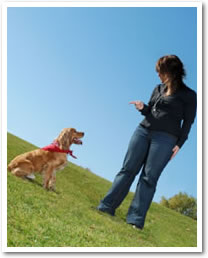What is the Difference?
The discussion often comes up on the differences (or similiarities) between dog training and dog behaviour. People who are dog trainers will glibly point out that there ‘are no degrees in dog behaviour’ – this is a fallacious statement designed to mislead and malign behaviourists. They may also say, “..sure they know all the science, but they aren’t good with dogs” – nothing could be farther from the truth.
Dog Training
What is Dog Training?
Dog training consists of teaching specific actions and skills. There are no credentials required to be a dog trainer, but there are great courses available where people can learn to become a dog trainer. Typically, trainers teach things like walking a dog, sit, stay, come, down and many other types of controls. Some may even have trick classes, agility, fly-ball and other types of exciting activities for dogs. Most trainers skills and experience is limited to these things. While there are some trainers who have advanced training, most have not.
A lot of trainers rely on Google, YouTube (along with various and sundry 1 day seminars) to improve their skillset. This is harmless and seemingly reasonable in most cases, but runs aground when confronted with real behavioural issues – especially issues with deeper pathology.
Animal Behaviour
What is Animal Behaviour?
To an ethologist, “a behaviour is the coordinated responses of whole living organisms to internal and/or external stimuli”, (Principles of Animal Behaviour – Dugatkin 2014). This is made up of conditioned and unconditioned stimuli & responses.
What is Ethology?
Ethology is the scientific and objective study of animal behaviour in a natural environment.
Animal Behaviour
A dog behaviourist is specifically trained and very often credentialed in the field of ethology (animal behaviour). In most cases, they have some form of post-secondary education and specialize in the specific problem behaviours that can occur in dogs. Generally, they will not offer ‘dog training services’, but some do. These credentials may include the following:
BSc. or MSc. (Bachelors/Masters of Science)
Zoology
Ethology
Veterinary Behaviour
Comparative Psychology
Diploma Certification (post-secondary)
ADBC (applied dog behaviour consultant) – full training and certification with post secondary education
CDBC (certified dog behaviour consultant) – no specific training provided but must meet a minimum educational requirement in core areas of behavior ( Fears & Phobias, etc.).
*
There are other credentials available, but they consist mostly of self-appointed professional organizations that provide no education in ethology/behavior
Conclusion
We have attempted to organize and explain some of the common misconceptions around the roles of a dog trainer and a behaviourist. To be clear, there are no laws regarding the use of the word ‘behaviourist’ (sometimes written as ‘behaviouralist’). This means that anyone can call themselves a behaviourist.
When hiring a behaviourist, credentialed and certified behaviourists will not get angry or defensive and will happily provide you the information you require. A person who isn’t credentialed will often become evasive and vague. A credentialed and experienced dog (animal) behaviourist should be your only choice when seeking help for problem dog behaviours.
-when someone tells you there ‘are no degrees in dog behaviour’ you can correct them, and tell them there really is.




